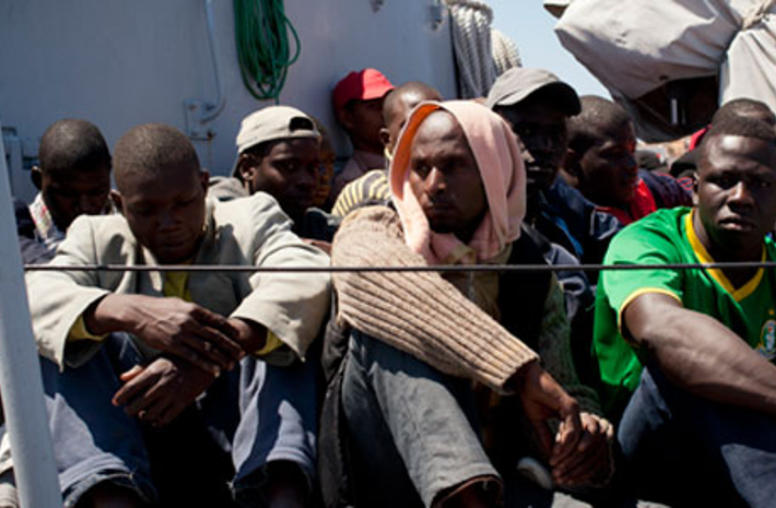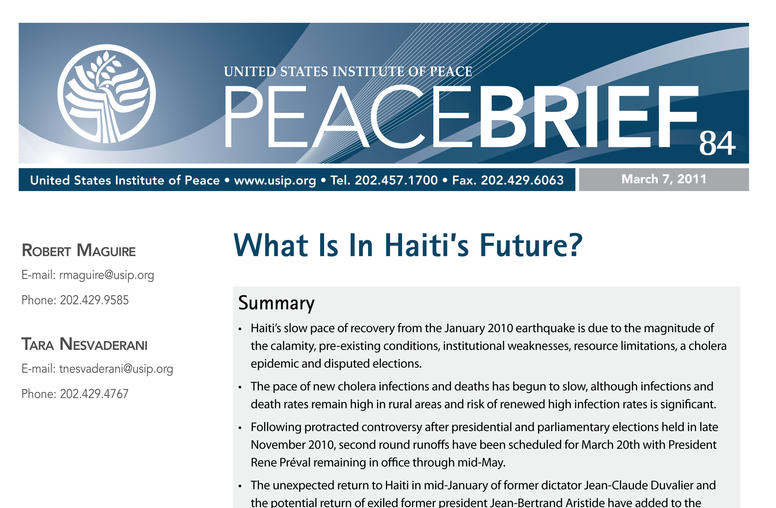Publications
Articles, publications, books, tools and multimedia features from the U.S. Institute of Peace provide the latest news, analysis, research findings, practitioner guides and reports, all related to the conflict zones and issues that are at the center of the Institute’s work to prevent and reduce violent conflict.
Making Economics Work for Peace
Economists typically work in the realm of modeling rational economic behavior and drafting policies to foster growth, income and financial stability in that context. But when conflict strikes, the best designed models and the normal interplay of supply and demand can run head-on into some brutal realities. The disconnect between economic theory and real-world practice in societies torn by conflict is something that USIP’s Raymond Gilpin experienced firsthand early in his career as the res...

Truth Commission Digital Collection
The United States Institute of Peace’s Truth Commissions Digital Collection is part of the Margarita S. Studemeister Digital Library in International Conflict Management. The collection contains profiles of truth commissions and substantive bodies of inquiry from nations worldwide - offering general background information on the composition of each body, links to the official legislative texts establishing such commissions, and each commission's final reports and findings.
USIP Making a Difference: The Plight of Christians and other Minorities in Iraq
Iraqi minorities are facing extinction -- the number of Christians for example has been halved, from 1.5 million in 2003 to about 850,000 today. USIP has been working with and supporting Iraq’s Christian and other minority communities since 2005, helping them to find Iraqi solutions to a seemingly insurmountable crisis.
Progress and Stability in the Middle East
USIP’s Steven Heydemann, vice president of the Grants and Fellowships program and special adviser to the Muslim World Initiative, describes the progress and challenges facing Egypt and Tunisia and how the U.S. can assist in stablizing the region.
USIP Letter of Support: University Presidents
In a letter of support, presidents and chancellors from 13 academic institutions voice concern over the recent House vote to eliminate USIP funding for the remainder of this fiscal year, and encourage U.S. lawmakers to protect USIP for the sake of national security.
Oil and Turmoil in Libya
As chaos worsens in Libya, USIP’s Raymond Gilpin assesses Libya’s management of its oil resources and the economic impact of the country’s instability.
Op-Eds Emphasize Importance of U.S. Institute of Peace
Michael Aloi and Charles DiSalvo, and Jonathan Riskind, write in West Virginia's Charleston Gazette and Pennsylvania's The Times Leader, respectively, on the importance of the U.S. Institute of Peace.
Senator John Kerry Supports USIP's Work in the Field
Sen. John Kerry highlights USIP's work in the field in his statement on the record concerning cuts to the international affairs federal budget.
USIP Contributes Expertise to the International Studies Association Convention
U.S. Institute of Peace scholars, fellows and staff will attend this month’s International Studies Association (ISA) Convention in Montreal, reflecting USIP’s central role in this field. The convention runs from March 16-19, 2011.

What Is In Haiti’s Future?
This report is based on views expressed during a January 26, 2010 event hosted by the U.S. Institute of Peace’s Haiti Working Group titled “What is in Haiti’s Future?” The event featured presentations by Thomas Adams, the U.S. State Department’s special coordinator for Haiti; Alexandre Abrantes, the World Bank’s special envoy to Haiti; Mark Schneider, senior vice president of the International Crisis Group; and Robert Fatton, University of Virginia’s associate dean for graduate programs.